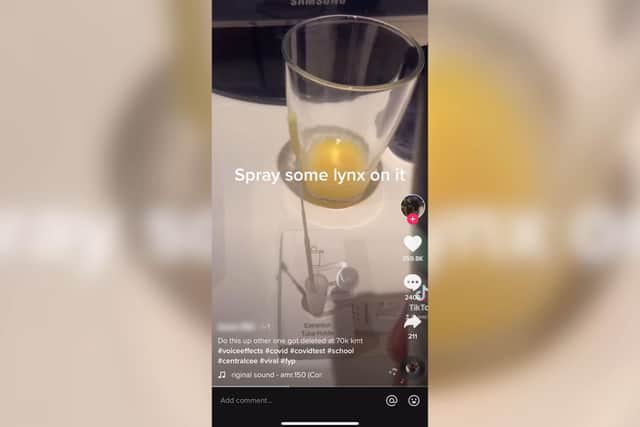Lemon juice Covid test: Parents' fury over pupils faking positive tests with TikTok trick
A parent was shocked when his teenage son was forced to self-isolate after a classmate faked a positive Covid test.
The dad says this new lemon juice trick – learned from TikTok videos – is further damaging his child’s education, which has already been ‘screwed up’ by coronavirus.
Advertisement
Hide AdAdvertisement
Hide AdTeenagers are being forced to self-isolate and could miss up to two weeks of school by their friends faking positive Covid-19 test results thanks to instructional videos on TikTok.
Clips of young people applying various liquids to lateral flow tests to trick it into displaying a positive result have been viewed millions of times, with many users swapping suggestions including Coca Cola, lemon juice and apple sauce.
It comes as self-isolations wreak havoc on school schedules with thousands of pupils taking days off after potentially coming into contact with an infected classmate.
‘You are going to get kids who can exploit this’
Matthew*, a parent from Greater Manchester, says his 14-year old son was sent home from school after a friend faked a positive test by following videos from TikTok.


He said: “We were told our child has been in close contact with someone who’s had a positive result, a girl who’s one of his close friends. He said that she’d faked it and that she’d seen it on TikTok, that there were loads of videos on how to fake it.
“As she wanted to fake the result as an easy way to stay off school, it meant around 10 of their close friends were all told to stay at home. I’d say around half of them don’t care, they’ll get to stay in bed all day.
“You are going to get kids who can exploit this. In the general scheme of things, their whole education has been fairly screwed up, so it’s annoying when it’s intentional and one person can have such a big effect on their immediate friends.”
Matthew said he had asked the girl to explain to her mother the test wasn’t legitimate and to do a PCR test to confirm she didn’t have the virus after a second lateral flow test conducted in front of a teacher returned a negative result.
Advertisement
Hide AdAdvertisement
Hide AdThe school is only able to encourage pupils who have tested positive using a lateral flow test to follow it up with a more accurate PCR test, he said.
‘His friends are happy to have the 10 days of extra holiday’
UK Government guidance dictates that all positive results from rapid tests should be confirmed with a PCR test booked either online or by calling 119 within two days of the result.
Whilst awaiting the PCR result, pupils, students and staff and close contacts should continue to self-isolate, according to UK Governnment advice on testing in schools and colleges.
The advice says: “If the PCR test is negative, provided it was taken within two days of the positive LFT, it overrides the lateral flow test and pupils, students and staff can return to school or college, and close contacts and other household members can stop self-isolating.”
It’s not currently clear when Matthew’s son will be able to return.
He said: “We know he’s off because of this person, but because of data protection, we can’t prove it. There’s a chance it could be someone else who’s genuinely positive, but it’s all very murky.
“For my son, this is an inconvenience because if he’s told to stay inside for 10 days, we’ll make him stay inside for 10 days. Other parents maybe aren’t as bothered.
"He’s the one that’s been pushing for her to come clean, which has been controversial because some of the other friends are just happy to have the 10 days of extra holiday.”*Name has been changed
This story originally originally featured on iNews.co.uk
Comments
Want to join the conversation? Please or to comment on this article.